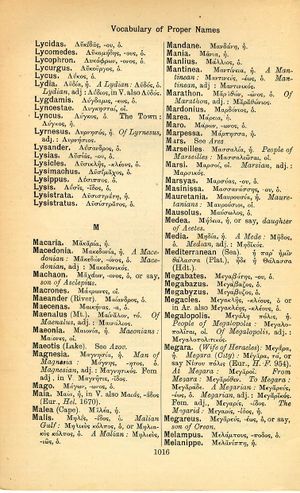Lysias
μελετᾶν οὖν χρὴ τὰ ποιοῦντα τὴν εὐδαιμονίαν, εἴπερ παρούσης μὲν αὐτῆς πάντα ἔχομεν, ἀπούσης δὲ πάντα πράττομεν εἰς τὸ ταύτην ἔχειν → one must practice the things which produce happiness, since if that is present we have everything and if it is absent we do everything in order to have it | so we must exercise ourselves in the things which bring happiness, since, if that be present, we have everything, and, if that be absent, all our actions are directed toward attaining it
English > Greek (Woodhouse)
Λυσίας, -ου, ὁ.
Latin > English (Lewis & Short)
Lysĭas: ae, m., = Λυσίας.
I Son of Cephalus, a famous orator of Athens: tum fuit Lysias, quem jam prope audeas oratorem perfectum dicere, Cic. Brut. 9, 35; cf. id. ib. 85, 293; id. de Or. 1, 54, 231; id. Or. 9, 29; Quint. 10, 1, 78; 12, 10, 24.—Hence,
B Lysĭăcus, a, um, adj., of or belonging to the orator Lysias: gracilitas, Quint. 12, 10, 24.—
II A physician, Cels. 5, 18.—
III A celebrated sculptor, Plin. 36, 5, 4, § 2.
Latin > French (Gaffiot 2016)
(1) Lȳsĭăs, ădis, f., ville de Phrygie : Plin. 5, 108.
(2) Lȳsĭās,¹⁴ æ, m. (Λυσίας), célèbre orateur athénien : Cic. Br. 35 || autres du même nom : Cels. Med. 5, 18 ; Plin. 36, 2.
Latin > German (Georges)
Lȳsiās, ae, Akk. am u. ān, m. (Λυσίας), ein berühmter Redner zu Athen, Zeitgenosse des Sokrates, Cic. de or. 2, 93; Brut. 63. Quint. 10, 1, 78. – Dav. Lȳsiacus, a, um (Λυσιακός), lysiakisch, des Lysias, Quint. 12, 10, 24.

